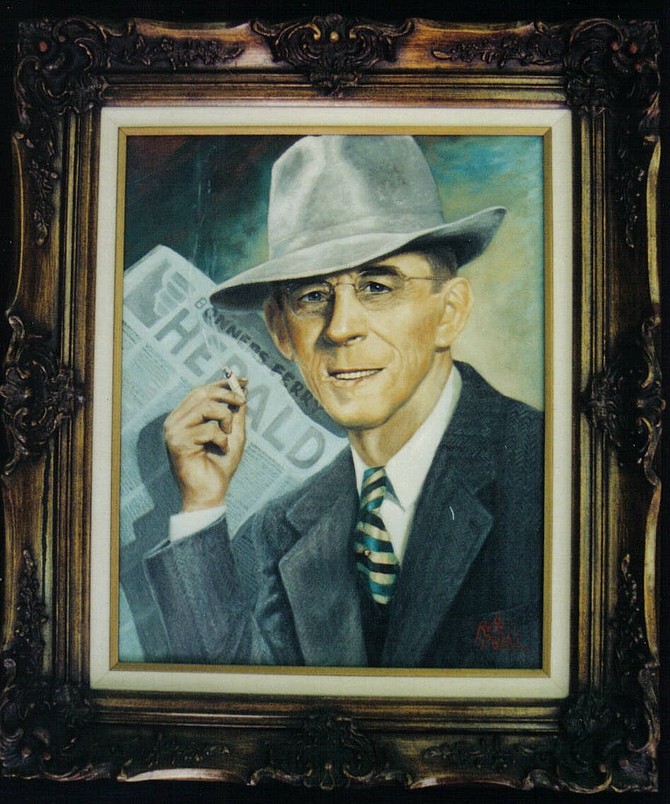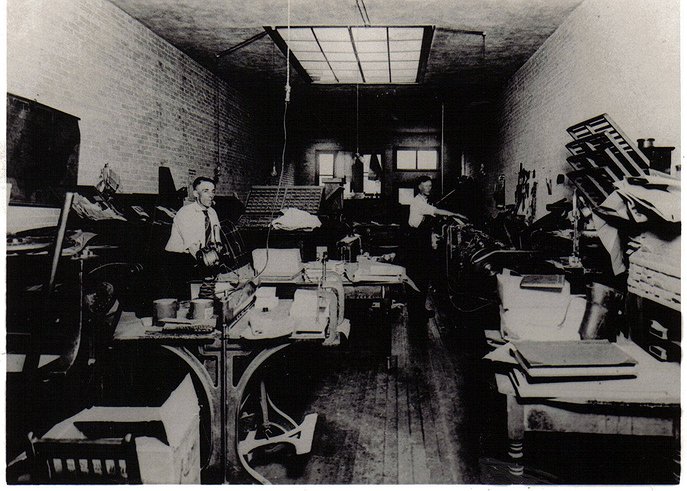132 years and counting for small-town paper

This painting of CW King is by Bette Myers and hangs in the hall of portraits at Boundary County Museum.
BONNERS FERRY — The Bonners Ferry Herald, a weekly newspaper in Boundary County, has served and informed the local community for 132 years and is the oldest business in the county.
The paper was first formed in 1891 by Stephen D. Taylor. The paper was originally set in the town of Kootenai on the north shore of Lake Pend Oreille and named the Kootenai Herald.
After six months, in 1892, The Herald moved north to the town of Bonners Ferry along the banks of the Kootenai River. The weekly eight-page, five-column paper was published on Saturdays and covered news from the communities of Sandpoint, Eaton, Eatonville, Fry, Bonners Ferry, and Hope.
Taylor renamed the newspaper the Bonners Ferry Herald on December 31, 1904, and sold the paper to C.W. “Charlie” King in 1912.
The paper was also owned by Richard M. Myers and Williams A. Chubb in 1946. The Herald was acquired by Ernest "Pete" Gale and Adell "Dellie" Thompson in 1978 and, in 1984, was sold along with Pend Oreille Printers and the Sandpoint Daily Bee as well as the Priest River Times, to the Hagadone Media Group.
Throughout the years and under multiple owners, the Herald has maintained its position as the community paper.
“Since its founding in 1904, the Bonners Ferry Herald has substantially contributed to our community, both culturally and economically,” said Clint Schroeder, president and executive publisher for the Hagadone Corporation's Communication Division/Hagadone Media and Newspaper Groups. “Beyond delivering news, we have proudly served as keepers of North Idaho's history, ensuring that the stories and events that shape our community are preserved for future generations.”
“In terms of job creation, we've provided opportunities for talented individuals to build careers in journalism and related fields, reinforcing our commitment to the region's economic well-being,” he said.
Throughout the decades the Herald has had to modernize in order to better reach readers and market advertisers across different mediums.
“Our ability to balance tradition with modernization is rooted in our deep connection to the community. We recognize the importance of preserving North Idaho's rich traditions and history while embracing new technologies and approaches to storytelling,” Schroeder said. “Our commitment to being the record of Boundary County extends to our mission of providing timeless, quality journalism that resonates with both long-time residents and new generations.”
Part of the longevity of the Herald and Hagadone Media Group papers is due to succession planning, or the process and strategy for replacement planning or passing on leadership roles.
“Succession planning is not just about business continuity; it's about preserving our role as historians of life in North Idaho,” Schroeder said.
“Aligning the right leadership with this directive has remained a top priority through the years. Chief among these priorities is to reinforce our dedication to mentoring local talent and uphold our values and commitment to the community. By passing on this legacy, we can safeguard the continuity of our mission,” he said.
Over the years, the Herald and other Hagadone Media Group papers have faced challenges, Schroeder said.
"But our commitment to the community has guided us through,” he said. “One significant test has been adapting to the digital age and the changing media landscape while ensuring that we remain the trusted source of information for Boundary County, whether in print, online, or in an app on the reader’s phone.”
“Our business is to meet the readers where they are, any time, with the news and information they need,” he said.
In order to meet readers where they are, the Herald uses additional media avenues outside the print paper, including social media, additional online content on the newspaper's website, and even a podcast for those who prefer audio.
Reputations are remembered not just by times of success, but times of trial and crisis. In 1916, the printing office sat underwater during a flood that devastated the entire Kootenai Valley and flooded Bonners Ferry Main Street. The next year the Herald moved locations, to a one-story brick building, the current site of Pace-Kerby Realty, and has continued to deliver the news weekly.
“The Bonners Ferry Herald has stood as a pillar of strength during times of crisis, such as COVID-19 and economic downturns. Our commitment to being the voice of Boundary County has shone through in our reporting, especially when our community needs an accurate, reliable, and empathetic partner,” Schroeder said. “We've adapted swiftly to ensure our community stays informed and connected, knowing that a trusted source of information is vital in times of uncertainty.”
Throughout the past 132 years, the Bonners Ferry Herald has covered the development and construction of the Great Northern Railway through Idaho’s panhandle, as well as the Coeur d'Alene mining wars. The paper also chronicled anti-Chinese sentiment in Idaho and the U.S., including the Chinese Exclusion Act and the forced expulsion of Chinese workers from Bonners Ferry in 1892.
The Bonners Ferry Herald has covered local elections, community news, public safety, and provided sports coverage for the county’s sole high school team, the Bonners Ferry Badgers for nearly a century.












